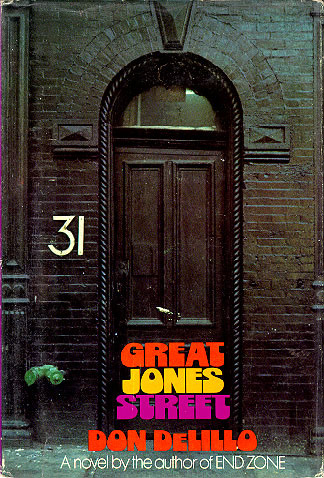

This page lists the known reviews of Don DeLillo's 1973 novel, Great Jones Street.
General Critical Reaction:
Nelson Algren wrote quite a good summary of the novel in his positive
review in the LA Times, though the general reaction to this book
was that it was a step back for DeLillo. As the NYT daily review
put it, "No, Mr. DeLillo is human after all." One complaint
was that it is quite hard to effectively satirize the world of
rock music, and rock lyrics. Several reviewers felt that the characters
did not hold up. Generally everyone recognized DeLillo's gifts
with language, however.
The brush-salesman is Dr. Pepper, Master of Disguise. At which point the reader realizes it isn't Bucky Wunderlick pulling an academician's leg, but the author pulling the reader's.Not to diminish DeLillo's essential seriousness. But he is a writer who, apparently to deflect any suspicion that he is a moralist, diverts the reader with cloak-and-dagger pursuits, and dialog as convincing as it is wild.
New York Times: April 16, 1973 - "DeLillo Runs Out of Bounds" review of Great Jones Street by C. Lehmann-Haupt.
Finally, the world of rock simply doesn't lend itself to interesting verbal parody. Smack in the middle of Great Jones Street there is a "Superslick Mind-Contracting Media Kit ... Told in news items, lyrics and dysfunctional interviews," which presumably is meant to satirize the verbal (?) outpourings of the rock world. But who, pray tell, (or rather who over the age of 30), can tell the difference between these lyrics ("The beast is loose/Least is best/Pee-pee-maw-maw") and the songs they are supposed to be satirizing?
New York Times Book Review: April 22, 1973 - page two review of Great Jones Street by Sara Blackburn.
For all of this, Great Jones Street is full of beautiful writing. It begins like this: "Fame requires every kind of excess. I mean true fame, a devouring neon, not the somber renown of waning statesmen or chinless kings. I mean long journeys across gray space. I mean danger, the edge of every void, the circumstance of one man imparting an erotic terror to the dreams of the republic." And this is DeLillo not nearly at his best, which usually combines these qualities of strong, clear imagery with a seemingly off-hand and piercing wit. There is a great deal of this kind of writing in Great Jones Street, but it doesn't save the book from being more of a sour, admirably written lecture than a novel, a book that is always puffing to keep up with the power and intensity of its subject.
Time: April 23, 1973 - review of Great Jones Street by R.Z. Sheppard.
By nudging his hero toward the truly mythic, DeLillo overextends a book that is otherwise distinguished by a cool, clinical touch. As he demonstrated in two previous novels (Americana and the much overpraised End Zone), the author has a knack for chill atmosphere, satiric caricature and witty dialogue. He is also a good literary mechanic who knows how to assmble spare parts from older writers like Nathanael West, Paul Bowles and William Burroughs, and drive off with them.
Washington Post Book World: April 15, 1973 - page one review of Great Jones Street by Webster Schott.
Don DeLillo's novel is cold water and no electricity. The agony behind it could make you cry. DeLillo is angry. Perhaps he is angry about everything. He hurts. Perhaps he is angry about Life. He is most angry at Art because it will not cure us. He may know what can help cure us. He smiles on the jacket of Great Jones Street.